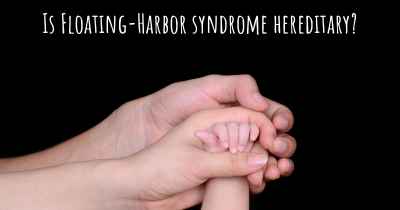Is there any natural treatment for Floating-Harbor syndrome?
Are there natural treatment(s) that may improve the quality of life of people with Floating-Harbor syndrome? Here you can see if there is any natural remedy and/or treatment that can help people with Floating-Harbor syndrome

Natural Treatment for Floating-Harbor Syndrome
Floating-Harbor syndrome (FHS) is a rare genetic disorder characterized by a variety of physical and developmental abnormalities. While there is currently no known cure for FHS, there are several natural treatment approaches that can help manage the symptoms and improve the quality of life for individuals with this condition.
1. Early Intervention and Supportive Therapies
Early intervention is crucial for individuals with Floating-Harbor syndrome. It involves a multidisciplinary approach that includes various supportive therapies to address the specific needs of the affected individual. These therapies may include:
- Physical therapy: Physical therapy can help improve muscle strength, coordination, and mobility. It may involve exercises, stretches, and other techniques tailored to the individual's needs.
- Occupational therapy: Occupational therapy focuses on developing skills necessary for daily activities, such as self-care, fine motor skills, and sensory integration.
- Speech therapy: Speech therapy can assist in improving communication skills, language development, and speech articulation.
- Behavioral therapy: Behavioral therapy can help manage behavioral challenges and develop coping strategies for individuals with FHS.
2. Nutritional Support
Proper nutrition plays a vital role in supporting overall health and well-being for individuals with Floating-Harbor syndrome. While there are no specific dietary guidelines for FHS, a balanced and nutritious diet is recommended. Some general tips include:
- Consult a dietitian: Working with a registered dietitian can help develop a personalized meal plan that meets the individual's nutritional needs.
- Ensure adequate hydration: Drinking enough water throughout the day is essential for overall health and can help prevent constipation, a common issue in individuals with FHS.
- Include a variety of foods: Encourage a diverse diet that includes fruits, vegetables, whole grains, lean proteins, and healthy fats.
- Consider supplements: In some cases, specific supplements may be recommended to address any nutritional deficiencies. However, it is important to consult a healthcare professional before starting any supplements.
3. Alternative Therapies
Several alternative therapies may complement traditional treatments for Floating-Harbor syndrome. While their effectiveness may vary from person to person, they can provide additional support and promote well-being. Some examples include:
- Acupuncture: Acupuncture involves the insertion of thin needles into specific points on the body to promote balance and alleviate various symptoms. It may help with pain management, sleep issues, and overall relaxation.
- Massage therapy: Massage therapy can help reduce muscle tension, improve circulation, and promote relaxation. It may also aid in managing stress and anxiety.
- Yoga and meditation: Practicing yoga and meditation techniques can help improve flexibility, balance, and mental well-being. These practices may also enhance focus and reduce anxiety.
- Aromatherapy: The use of essential oils in aromatherapy can have a calming effect and promote relaxation. Lavender, chamomile, and frankincense are some examples of oils that may be beneficial.
4. Emotional and Social Support
Living with a rare genetic disorder like Floating-Harbor syndrome can be challenging, both for the affected individual and their families. Emotional and social support are crucial components of holistic care. Here are some ways to access support:
- Support groups: Joining support groups or online communities can provide a platform to connect with others facing similar challenges, share experiences, and gain emotional support.
- Counseling: Individual or family counseling can help address emotional and psychological aspects associated with FHS. A qualified therapist can provide guidance, coping strategies, and a safe space to express feelings.
- Education and advocacy: Educating oneself about Floating-Harbor syndrome and advocating for the affected individual's needs can empower families and help them navigate the healthcare system more effectively.
Disclaimer: It is important to note that while these natural treatment approaches may provide support and improve symptoms, they should not replace medical advice. Always consult with healthcare professionals and specialists familiar with Floating-Harbor syndrome for personalized guidance and recommendations.








